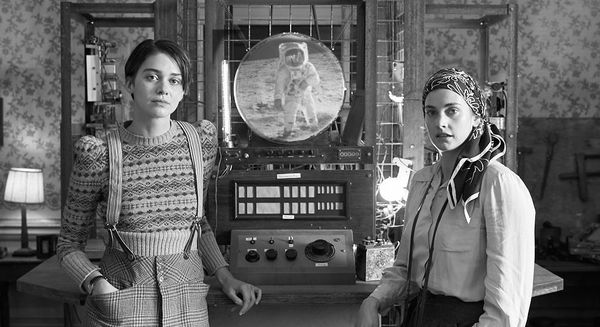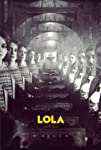Eye For Film >> Movies >> LOLA (2022) Film Review

One of the delights of covering film festivals is that there are always hidden gems to be discovered. Screening as part of Frightfest and also included in the Edinburgh International Film Festival line-up for 2022, this début feature by Andrew Legge was made on a microbudget with a cast who work primarily on the small screen, but it very much deserves a place on the big one. Building cleverly on a simple science fiction premise, it delivers a story full of moral and emotional difficulty with an acute awareness of possibility and rare moments of joie de vivre.
Presented as a recovered film from 1941, a composite piece created by a woman called Martha (Stephanie Martini) for her sister Thomasina (Emma Appleton), it opens in 1938 with the invention of a machine – named Lola in honour of the sisters’ deceased mother – which can pick up radio and television broadcasts from the future. Imagining what it would mean then to switch on a screen and see David Bowie singing Space Oddity (that video, of course, opening with oscilloscope waves) immediately sets the tone. Martha – known to her sister as Mars – is overjoyed to discover a wealth of extraordinary new music, and although it isn’t directly stated, one gets the impression that both women are inspired by the gender politics of the future, reinforcing as it does what their mother taught them about women’s ability to do anything men can do.
They also take advantage of their machine as any sensible person would, to secure an income – conveyed by a single shot of a cheekily grinning Mars making notes as she watches a horse race – and soon there’s a horse wandering through the house, a fancy toy car parked in the driveway, and much more besides. But of course, what lies in the future isn’t all good news. When they see broadcasts about the Nazi advance and the aerial bombardment of London, they feel compelled to issue warnings, with predictable results. Lives are saved, but they and their invention are tracked down. Whilst they try to make the best of the situation, aiding more directly in the war effort, and Mars begins a romance with a young military officer, other things are shifting. A Kinks song performed at a party inadvertently becomes a hit ahead of its time, and one day Mars turns on Lola and finds, in place of David Bowie, something far more sinister.
Beautifully drawn characters lend a lot of heart to a story which might easily have been told in a more mechanical way, and keep the human factor prominent. Legge doesn’t rely on the changing of the future to shock an audience which has heard that tale many times before, but weaves a more complex story, very neatly tied together and, in its totality, addressing one of science fiction’s trickier big questions. Alongside the dramatic performances, he draws on an abundance of archive material, occasionally altering it or taking it out of context, but presenting much of it simply as is. Period recreations are kept simple, the sisters’ isolated home obviating the need for more costly work.
Rounding out all this, and coming into full bloom as we begin to see more of the reshaped future, is some brilliantly rewritten music, exploring how key songs and movements might have turned out in a different cultural context. This provides a strange form of delight as the story grows increasingly dark. The focus on broadcasts allows viewers to experience a blend of news and popular culture alongside the sisters’ own story, creating a much richer sense of what it might mean to live in an altered history than most attempts at that have achieved.
A modest little film it may be, but one really hopes that Lola gets the wide release it deserves. It’s a film which could bear many a repeat viewing. By turns enchanting and heartbreaking, it speaks to the troubled history of the 20th Century yet feels bang up to date. In the absence of a lens on the future, it invites us to think about what we might learn from the past.
Reviewed on: 27 Aug 2022
















